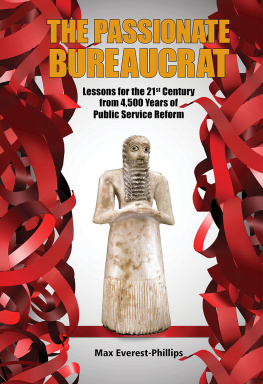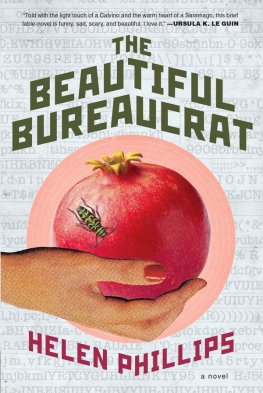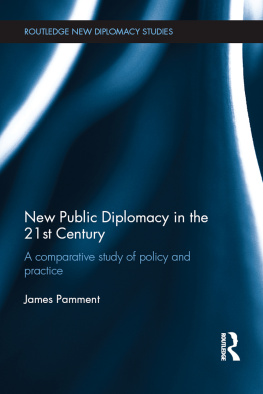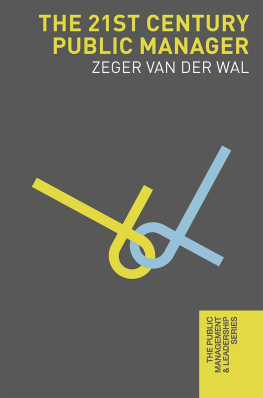THE PASSIONATE BUREAUCRAT
THE PASSIONATE BUREAUCRAT
Lessons for the 21st Century from 4,500 Years of Public Service Reform
Max Everest-Phillips
UNDP Global Center for Public Service Excellence, Singapore
Published by
World Scientific Publishing Co. Pte. Ltd.
5 Toh Tuck Link, Singapore 596224
USA office: 27 Warren Street, Suite 401-402, Hackensack, NJ 07601
UK office: 57 Shelton Street, Covent Garden, London WC2H 9HE
Library of Congress Control Number: 2018014014
British Library Cataloguing-in-Publication Data
A catalogue record for this book is available from the British Library.
This book is written by the Director of the UNDP Global Centre for Public Service Excellence (GCPSE) in Singapore. The views expressed in this publication are those of the author and do not necessarily represent those of the Government of Singapore or the United Nations, including UNDP or any UN Member states.
THE PASSIONATE BUREAUCRAT
Lessons for the 21st Century from 4,500 Years of Public Service Reform
Copyright 2018 by Max Everest-Phillips
All rights reserved.
ISBN 978-981-3234-82-6
For any available supplementary material, please visit
http://www.worldscientific.com/worldscibooks/10.1142/10843#t=suppl
Desk Editor: Shreya Gopi
Typeset by Stallion Press
Email:
Printed in Singapore
The two best preserved cone-shaped clay tablets that describe Urukaginas reforms of public administration in the Mesopotamian city-state of Lagash around 2350 BC.
Bliss it was in that dawn to be alive
But to be young was very heaven! Oh! Times
In which the meagre, stale, forbidding ways
Of custom, law, and statute, took at once
The attraction of a country in romance!
from
The French Revolution as it Appeared to Enthusiasts at its Commencement
by
William Wordsworth (17701850)
Dedication
To my wonderful daughters
Emily and Claudia
Years ago I first tried to explain to you why public administration is interesting. You both looked at me bemused, and together declared: That sounds dull.
This is my second attempt.
With all my love.
30-cm high Lagash sculpture from the pre-Sargonic era: British Museum (Creative Commons license).
Foreword: Look Back to See Ahead
I am delighted to offer a few introductory remarks to this fascinating book on the first 4500 years of public sector reform. At the dawn of civilisation, the ruler of a Sumerian city-state had a radical idea. For the first time in recorded history, Urukagina of Lagash condemned systemic corruption in the civil service and proposed that public officials should work in the interest of citizens, rather than of their leaders and themselves. This ambitious concept remains with us: fulfilled in some places, but still to be achieved in others.
Three great and inter-related inventions of early civilisation were agriculture, public works and public administration. The bureaucrat fostered the planning, record-keeping and numeracy needed for the other two to develop. That remarkable achievement is a reminder of the power of public service to transform any economy and society just as today officials are called upon to achieve the Sustainable Development Goals (SDGs) by 2030.
This book is a fascinating read and unashamedly innovative. It demonstrates that the first known reform of public administration, at Lagash in Mesopotamia some 4400 years ago, still has much to teach us. Perhaps more unexpectedly, it also argues that plus a change, plus cest la mme chose: a good grounding in public sector reforms of the 21st century is useful for interpreting the tantalisingly limited evidence from ancient cuneiform tablets about those Sumerian reforms.
In so doing, this monograph draws parallels between the uncertainty in one of the worlds most ancient civilisations and in the current context. The intellectual interest in looking for principles guiding public administrative reform based on common principles and shared human values across such different times and contexts is to assist todays pursuit of public service excellence.
History, in explaining who we are and why we are the way we are, offers an invaluable anchor in the turbulent waters of our era. Humanity navigates Janus-like, looking both to the past and to the future for guidance and inspiration. In the present turmoil of fake news and post-fact truth, the historian provides a glimpse of objective reflection on effective government.
In this thoroughly researched tome, Max takes us back to the dawn of civilisation. The worlds first attempt to create a motivated and empowered public service offers lessons for modern times for developing countries. With typical imagination and flair, Max shows us that a new Bureaucratic Revolution is underway. He argues that this will combine old skills of rational decision-making with new skills of passion and empathy. The despised bureaucrat of the late 20th century is the key competitive advantage of the 21st century.
The Global Centre for Public Service Excellence in Singapore has long been a key partner of the Astana Civil Service Hub. This is because, under the inspiring leadership of Max Everest-Phillips, his Centre has helped the UNDP to develop or adapt new thinking on building effective, accountable and transparent institutions in the public sector.
This book fizzes with important ideas, not least why an appreciation of history becomes more important as the future becomes more uncertain. Through Urukagina, we are reminded that the past is humanitys invaluable guide towards a better future. This study will help any reformer consider the challenges ahead while ensuring that public administration of the past will never again seem dull!
Alikhan Baimenov
Chairman
The Astana Civil Service Hub
Kazakhstan
Acknowledgments
Livet m forsts baglns, men m leves forlns.
(Life can only be understood backwards, but must be lived forwards).
Soren Kierkegaard
Why is the public service so evidently important yet so routinely derided, so easy to alter yet so infuriatingly difficult to improve? Gaining a grasp on the mercurial ectoplasm of public administration has taken me over 40 years, and I am still not certain that what we know is worth knowing.
Nevertheless, a new era in public service, the 4th Bureaucratic Revolution, is taking shape. This revolution is being driven by the heady cocktail of political turbulence and disruptive technology. As states jostle to keep up with globalisation while keeping the parochial interests of their citizens satisfied, the bureaucrat of the late 20th century, despised as inferior to her private sector counterpart, becomes a key competitive advantage of the 21st century. This is an unashamedly self-serving observation. Having been one of those faceless functionaries for much of the last four decades, it may perhaps be wishful thinking. I hope, however, the reader will see merit in the argument.











